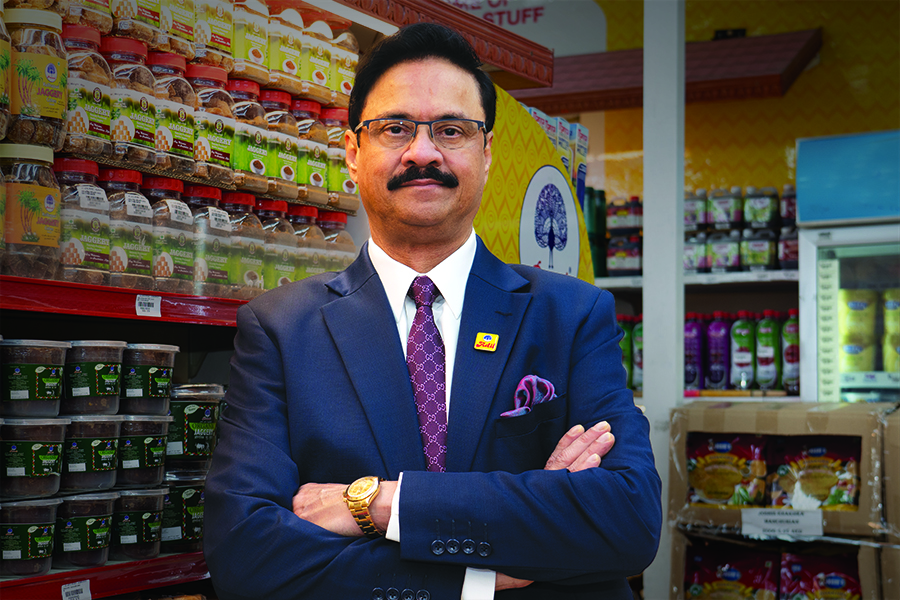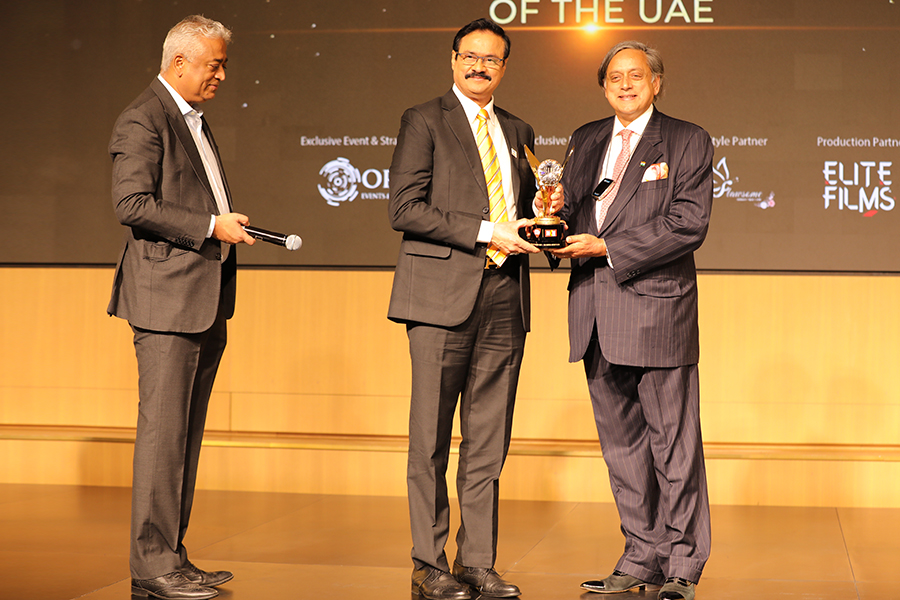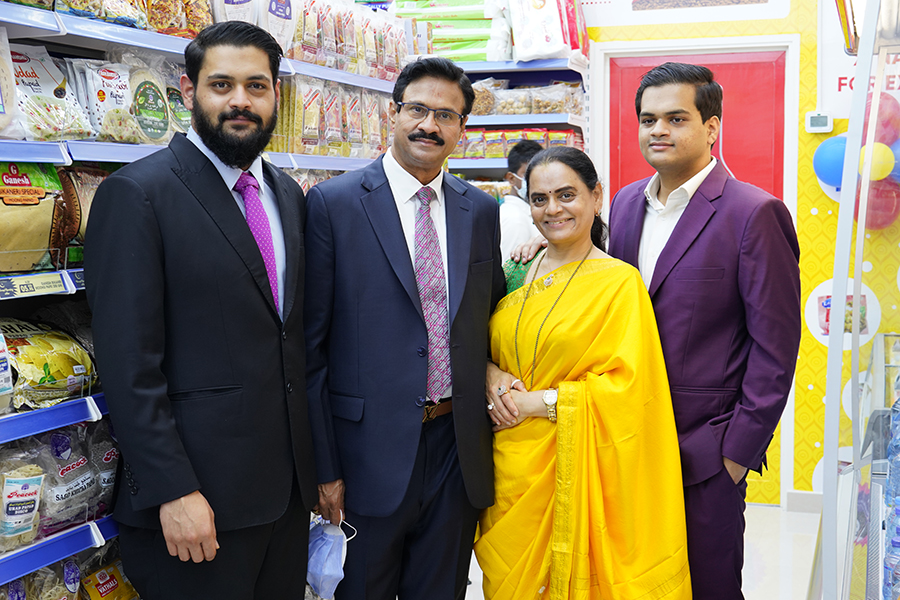
Dr. Dhananjay Datar Chairman & Managing Director ADIL Trading Co. LLC
Dr. Dhananjay Datar Chairman & Managing Director ADIL Trading Co. LLC holds the ‘Masala King’ title bestowed on him way back in 2001 by the UAE leadership for his invaluable contribution to the food and grocery sector.
Here’s what he said during an exclusive interview with IMAGES RetailME. “I strongly believe that our success is not just measured by business metrics but through the positive contributions we make towards society and the lives we touch. As a leader, I aim to make a positive impact through integrity, empathy and resilience, striving to inspire and empower individuals to reach their full potential.”

Memories, masalas & more: A perfect sweet spot
Yearning and nostalgia for authentic Indian products was a gap that seasoned entrepreneur Datar spotted and built not just a brand but a multi award winning business empire that seeks to promote the rich Indian culture through a diverse range of products in the Gulf region and beyond, while creating employment opportunities. That’s the magic of ADIL, a UAE-based grocery retailer.
Over the decades, ADIL has continued to evolve to resonate with multi-generational Indian expatriate community through a wide range of high-quality food and non-food products, a personalised shopping experience and its deep commitment to many social causes.

ADIL Trading Co. LLC at a glance

The makings of a masala empire
Datar’s journey has been full of ups and downs. Born in a middle-class Maharashtrian family in India, he was exposed to poverty from an impressionable age and therein learnt many lessons too. Here’s one of the many incidents that he vividly remembers. Many years ago, while growing up Datar was invited to attend a banquet in his village. Just before the meal was served, an elderly person arrogantly ordered him to vacate the seat as the first batch of the banquet was reserved for prestigious guests.
“To this day, I remember returning home with tears streaming down my eyes. After I narrated the incident to my mother, she said something that will always stay with me: ‘Son, in today’s world respect is given to those who are prosperous. If you want respect from others in the future, work hard and acquire prosperity.’ That incident left a deep scar but also a burning desire to prove my worth.” Datar’s upbringing taught him the values of self-reliance, frugality and hard work. “It also inculcated in me the spirit to struggle against all odds. Giving up was never an option,” he shared.
Without any financial knowledge or entrepreneurial background, Datar dreamt of owning a business. During his college days, he sold phenyl and instant mixes door-to-door in Mumbai’s suburbs and thus learned the art of selling. A few years later, aspiring to pursue his entrepreneurial dreams he moved to the UAE. Around that time [in the early 80s] Datar’s father who was working here noticed the demand for cultural foodstuffs among the Indian community in Dubai, but there weren’t many sellers.
So, he set up a small grocery shop under the name ‘ADIL Trading Company’ and hired his son as an intern. “The start was rough as our business suffered a huge loss in the first year itself. We had no reserves to cover the losses. My mother sold her jewellery to help us sustain the business. This incident changed my outlook towards the business; I worked 16 hours a day and ate whatever was available. We couldn’t even afford a bicycle, so we delivered goods by foot. From sweeping, cleaning and carrying heavy bags I eventually learnt how to manage a store,” Datar shared.
If anything, Datar’s journey has been replete with events that shaped him into a highly successful business tycoon. One such incident was an encounter with an elderly Bangladeshi trader who was his father’s friend. Once the trader offered to sell 40-kilograms of red chilli powder to Datar on credit since the latter didn’t have enough money to purchase the stock. On a sweltering summer afternoon, Datar carried the heavy bag on his shoulder. The chilli powder mixed with his sweat and his skin began to burn but he didn’t give up. The entire stock was sold in a fortnight fetching a handsome profit. After three years of rigorous work, the father-son duo succeeded in establishing their business as their small shop started to earn healthy profit.
Soon Datar’s father retired handing him over the responsibility to manage the business. Datar wanted to expand the business but was reluctant to take bank loans. So, he devised an ingenuous strategy inspired by a tea shop owner. “Back in the days I’d visit a tea shop and noticed that the owner would keep aside money in boxes. On casually enquiring, I learnt that the owner always kept aside two AED100 notes from the day’s income in two tin boxes. At the end of the month each tin contained a sum of AED3,000; he used the money from the first tin to cover expenses, while the amount from the other tin was his profit. Fascinated by this idea, I followed the same strategy, saving AED500 daily in two tins and resolved to open it after a year. When I opened the tins, the amount exceeded AED180,000. With that investment, we opened a shop in Abu Dhabi. Following the same strategy, the next year we built a corpus of AED360,000 with which we opened our third shop in Sharjah.”
Datar continued to use this technique and when his savings touched AED540,000, he opened a spice processing plant. “The magic of saving and compounding made it possible for us to expand our business multi-fold,” he said with a smile.

Musings beyond masalas
Tell us about the current state of the regional food and grocery landscape.
The regional food and grocery landscape is undergoing significant transformations, marked by three key innovations. Firstly, technology is playing a pivotal role in enhancing customer experience through agile digital platforms and curation of personalised offers by leveraging data analytics. Secondly, there is a growing emphasis on food security which has prompted a shift towards local production and sourcing, therein fostering community engagement and deeper collaborations with local suppliers to ensure a steady supply of essentials also aligning with the region’s broader goal of sustainable development. Finally, the industry is investing heavily in advanced technologies such as automation and data analytics to build a resilient supply chain to mitigate disruptions while ensuring the smooth flow of goods from production to distribution, enhancing efficiency, reducing lead times and optimising inventory management.
One key development in 2024 that you think will have a positive impact on the regional food & grocery industry.
A specific development poised to positively impact our industry in 2024 is the increased adoption of blockchain technology. One of the key benefits of blockchain in the food commodity market is the ability to trace the journey of products back to their origin, crucial for prompt identification of the source of any contamination or quality issues. Now more than ever before, consumers are concerned about the origin and safety of products they consume and blockchain provides a robust solution to address these concerns by offering an unalterable record of each product’s journey. Blockchain technology also minimises the risk of fraud and ensures the integrity of supply chain, which helps in building and maintaining consumer trust.
Some challenges of the regional food & grocery industry that come to your mind and what steps do you undertake to stay ahead of the curve?
Our industry faces many challenges owing to rising operational costs, the need for continuous innovation and heightened competition. To address these, at ADIL we focus on operational efficiency and embrace technology to stay ahead of market trends. Do you ever worry about increasing competition? I feel competition is healthy; it drives us to consistently elevate our standards, pushing us to deliver better value, quality and service to our customers.
Through ADIL how are you building a sustainable future?
ADIL has undertaken substantial strides towards sustainability by reducing our carbon footprint and promoting eco-friendly practices. We have implemented waste reduction programmes, which include reduced plastic usage and adoption of energy-efficient practices in our supermarkets. Our commitment extends to offering an organic product range sourced from sustainable suppliers. And I’m personally involved in several social and charitable initiatives, reinforcing our commitment to creating a positive impact beyond business.
Your strategic growth plans for 2024 and beyond?
Our strategic growth plans for 2024 involve expanding our footprint in existing markets. As such we are planning to open six new stores in the UAE this year to get closer to the communities we serve, and we will evaluate venturing into new regions. We will continue leveraging technology for enhanced customer engagement, introduce innovative products and strengthen our supply chain for optimal efficiency. Importantly, sustainability and community engagement will remain at the core of our growth strategy.
Do tell us your ‘masala’ for success.
Honesty, hard work and determination are crucial to make our dreams come true. I also think irrespective of a business being small or big, it’s important for every entrepreneur to operate in a manner that leads to sustained customer satisfaction.
To read the story in print, pick up the February 2024 edition of IMAGES RetailME.
Notifications
You must be logged in to post a comment.